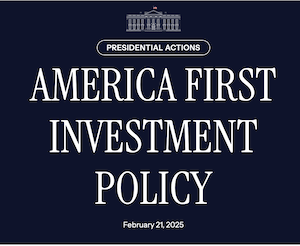The Executive Order titled “America First Investment Policy,” issued on February 21, 2025, aims to bolster U.S. national and economic security through a dual approach to foreign investment.
This EO that just dropped is the economic equivalent of a hypersonic tactical nuclear weapon. pic.twitter.com/fLPu2LiASO
— joshua steinman (,
) (@JoshuaSteinman) February 22, 2025
The “America First Investment Policy” Executive Order, signed on February 21, 2025, isn’t just a security play; it’s poised to ripple through U.S. commerce in some big ways. By offering a fast-track review process for investments from allied nations, it could juice up inbound capital flows from countries like Japan, the UK, or Canada, especially in key sectors like tech, manufacturing, and healthcare. Businesses in these industries might see a surge in partnerships or funding, potentially boosting innovation and job growth—think more factories humming or startups scaling faster with foreign cash that’s easier to greenlight.
On the flip side, the tightened restrictions on investments from adversarial nations—China being the obvious target—could shake up supply chains and trade dynamics. Companies relying on Chinese capital or tech, like those in semiconductors or biotech, might face higher costs or delays as they pivot to alternative sources. This could hit commerce hard in the short term, especially for firms unprepared to untangle from those markets. Over time, though, it might spark a reshoring trend, with businesses incentivized to keep operations domestic or within the “friendly” orbit, aligning with the order’s goal of economic security.
The President just released a new policy that does some big things:
— Crémieux (@cremieuxrecueil) February 24, 2025
– It makes it easier for friendly nations to invest in the U.S.
– It makes it harder for hostile nations to invest in the U.S.
– It makes it harder for hostile nations to steal American technology
And morepic.twitter.com/I8ulG3fked
How it works
It seeks to encourage investment from allied and partner nations by offering a fast-track review process, provided these investors avoid partnerships with foreign adversaries. At the same time, it tightens restrictions on investments from countries deemed threats, particularly focusing on protecting critical sectors like technology and healthcare.
The policy builds on existing frameworks, such as the International Emergency Economic Powers Act and prior executive orders targeting Chinese military and security-related companies, while reviewing measures like Executive Order 14105 (from August 2023) to ensure robust national security safeguards.
It also prioritizes protecting U.S. investors by scrutinizing foreign-adversary companies on U.S. exchanges and reinforcing fiduciary standards for pension plans. Implementation is directed primarily through the Secretary of the Treasury, in coordination with other federal agencies, to balance economic growth with security.
This order reflects a core commitment to prioritize American economic and national security interests by encouraging investment from allied nations while cracking down on financial ties to adversarial countries. It’s a bold move to safeguard critical industries like technology and healthcare, ensuring that the U.S. maintains its edge in an increasingly competitive global landscape and it aligns seamlessly with Trump’s election promises from the 2024 campaign, where he pledged to put “America First” by revitalizing the economy, protecting domestic industries, and countering foreign threats—particularly from nations like China.
